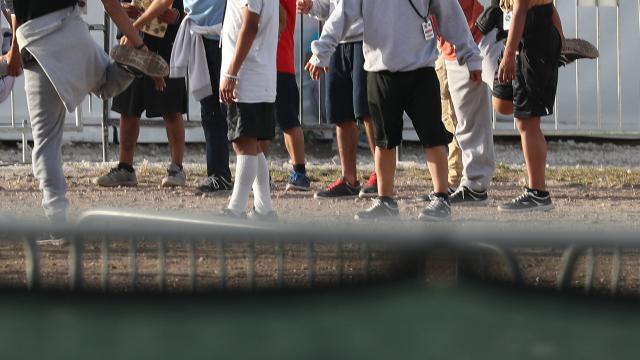As part of a push to bolster deportation efforts, the Trump administration took steps this month to blur the lines between U.S. Immigration and Customs Enforcement (ICE) and the U.S. Office of Refugee Resettlement (ORR), an agency responsible for unaccompanied migrant children, according to six current and former administration officials who spoke with the Washington Post.
Led by Stephen Miller, the administration’s top immigration adviser, this covert operation initially sought to plant immigration enforcement officials within the agency to target adults who came forward as potential sponsors for these children—typically their parents or relatives—for possible deportation. The U.S. Department of Health and Human Services (HHS), which oversees the resettlement agency, denied this proposal but greenlit ICE agents to collect biometric information and fingerprints from any adults who fail to pass ORR’s vetting processes and are ultimately denied custody, per the Post’s report.
This new measure appears to contradict a previous legal provision enacted by Congress to shield these potential sponsors and their identifying information from ICE investigators. Past information-sharing efforts between these two departments have deterred sponsors from coming forward out of fear of being arrested or deported, thus exacerbating the government’s backlog of underage migrants in custody. (And it’s also generated plenty of bad press for the administration, what with potentially forcing migrant parents to choose between seeing their child again or risking deportation).
[referenced url=” thumb=” title=” excerpt=”]
The catch, though, is that if a potential sponsor’s application is rejected, “that individual is no longer considered to be a sponsor or potential sponsor,” ICE spokesman Bryan Cox told the Post. Therefore, those legal protections no longer apply.
According to the Post’s report, Cox explained this cooperation and information sharing facilitates a more thorough vetting process before placing unaccompanied minors with sponsors. ICE has access to more advanced screening tools than HHS, he argued, “including better capabilities to identify fraudulent documents or documents obtained by fraud.” Improved vetting “should take precedence over speed of placement to what may ultimately be an unsafe environment for the child,” he told the Post.
HHS spokesperson Mark Weber confirmed to the Post that ICE agents would not be setting up shop in the department but did not comment on the legality of this new interdepartmental cooperation.
Roughly 4300 unaccompanied minors are currently in U.S. custody, per the report, down from 15,000 at the height of the administration’s “zero tolerance” policy last year.
